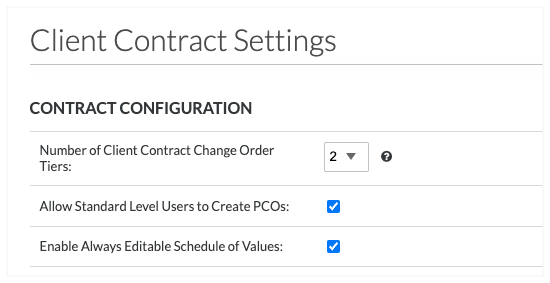Configure Settings: Client Contracts
Objective
To configure the advanced settings for the project's Client Contracts tool.
Background
When setting up a Procore project, a user with 'Admin' permission on the Client Contracts tool will first use the steps below to configure the tool's settings for users of the tool. Because users can create a single client contract or multiple head contracts on a single project (see Create Client Contracts), the settings listed below are applied globally to all of the client contracts in a project:
- Contract Configuration. Define the number of head variation tiers for the project, gives you the option to grant users with 'Standard' permission on the Client Contracts tool, the privilege to create potential variations and the ability to choose if you want to make the Schedule of Values (SOV) editable.
- Default Distributions. Specify the users to include by default on the Client Contracts tool's email notification distributions.
- Funding Sources. List any funding sources related to the client contract. A funding source can include federal, state and local funds, bonds, grants, tax revenue, loans, programs and more.
You can also set up customised settings to apply to each client contract that your users create in a single project. To learn more, see Edit the Advanced Settings on a Client Contract.
Things to Consider
- Required User Permissions:
- 'Admin' level permissions on the project's Client Contracts tool.
- 'Admin' level permissions on the project's Client Contracts tool.
- Additional Information:
- Additional settings for a project's client contract are in the tool's Advanced Settings tab. See Edit the Advanced Settings on a Client Contract.
Prerequisites
- Determine the number of variation tiers that you want to apply to your project. To learn more, see What are the different variation tier settings in Project Financials?
Steps
- Navigate to the project's Client Contracts tool.
- Click the Configure Settings
 icon.
icon. - Under Contract Configuration, do the following:

- Number of Client Contract Variation Tiers
Select one option from the drop-down list to define how variations will be managed on the project:Important
This setting cannot be changed after the first variation is created on the project.- 1. A one (1) tier variation configuration requires users to create only Client Contract Variations. See Create a Client Contract Variation.
- 2. A two (2) tier variation configuration gives users the ability to create potential variation (see Create a Potential Variation for a Client Contract) that can then be grouped into a Client Contract Variation and sent to a user for approval. This is the default setting for Procore projects. This is the default setting.
Notes
- A three (3) tier variation configuration is also available. To learn more, see What are the different variation tier settings in Project Financials?
- If your company or project billing process does NOT require you to group all of the approved variations for the month into a single, combined variation for final signature, Procore recommends configuring the two-tier variation configuration setting on the Client Contracts tool.
- Allow Standard Level Users to Create PVs
Mark this checkbox to grant users with 'Standard' permissions the ability to create a PV on the Variations tab of a client contract.
Note: If you clear the mark from the checkbox, only users with 'Admin' permission can create a PV using the Variations tab of a client contract. - Enable Always Editable Program of Values
Mark this checkbox to provide users with editing permissions the ability to add, update and remove line items from the SOV when the contract is in any status. Clear the mark to restrict users from editing the schedule of values. To learn more, see What is the 'Enable Always Editable Schedule of Values' setting?Note
For Procore users who turn the 'Enable Always Editable Schedule of Values' setting ON, be aware that this setting is NOT currently supported when your project is configured to use one of Procore's ERP Integrations tools. Keep in mind that only a select number of integrated ERP systems support a one-directional sync from the integrated ERP system to Procore's Head Contracts tool. Updating a head contract's line items when its data is being synced with an integrated ERP system is NOT recommended.
- Number of Client Contract Variation Tiers
- Under Contract Dates, users who have been granted 'Admin' level permissions on the company's Admin tool can click the Contract Fieldsets page in the Company Admin Tool link in the BLUE informational banner pictured below.
Note
The 'Contract Dates' section has been moved to the 'Fieldsets' tab in Company level Admin tool. To learn how to create fieldsets, see Create New Configurable Fieldsets. - Under Default Distributions, select a person from each drop-down list.
- Client Contract
Select default distributions to be included in communication regarding the client contract. This can be people who need to review the client contract before it is approved. - Client Contract Variation
Select default distributions to be included in communications about variations. - Client Contract Variation Request
Select default distributions to be included in communications about variation requests. - Client Contract Potential Variation
Select default distributions to be included in communication about potential variations.
- Client Contract
- Click Update.
- Under Funding Sources, create a list of funding sources for your project. A funding source can include federal, state and local funds, bonds, grants, tax revenue, loans, programs and more. See Create Client Contracts.

- Name. Enter the name of a funding source in the box.
- Description. Enter a description of the funding source in the box.
- Click the plus (+) sign to add the line item.
- Click Update.


 The Client Contracts tool is available as a
The Client Contracts tool is available as a